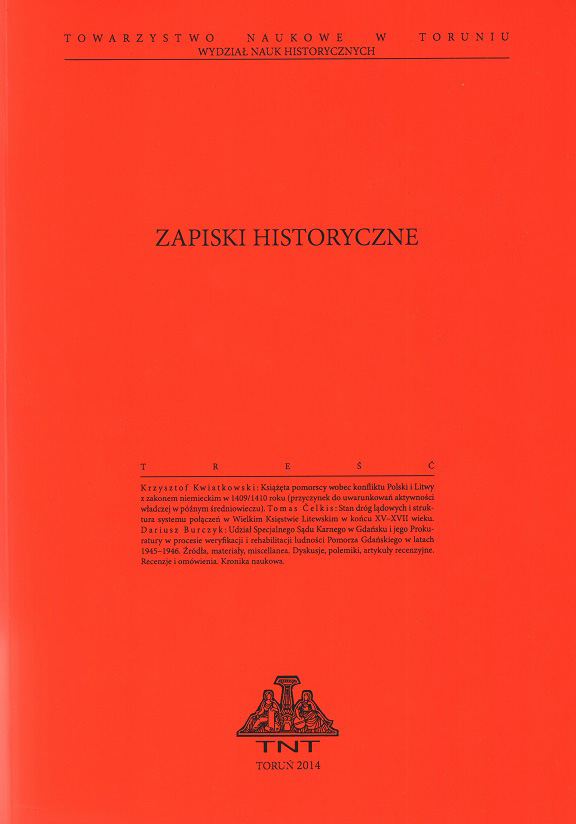Deputacja Kamery Wojenno-Skarbowej w Koszalinie – eksperyment administracji monarchii absolutnej
The Deputation of the Military and Treasury Chamber in Koszalin – an Experiment of the Administration of the Absolute Monarchy
Author(s): Paweł GutSubject(s): Cultural history, Local History / Microhistory, Political history, 18th Century
Published by: Towarzystwo Naukowe w Toruniu
Keywords: Pomerania; Prussia; Frederick II; absolutism; administration;deputation;
Summary/Abstract: The classic administration of Prussian absolutism was the work of Friedrich Wilhelm I and his son Frederick II. The first one was its organizer, and the latter not only dealt with its organization, but also used it pragmatically in achieving his goals. One of such activities of Frederick II at the time of rebuilding the state after the Seven Years’ War was the creation of a deputation of war and treasury chambers, which were to relieve the war and treasury chambers in vast departments (provinces). Their prototype was the deputation in Gąbno (Gumbinnen), operating in the years 1724–1736 in the Lithuanian districts of the province of Prussia. Frederick II founded the first deputation in Koszalin in 1764 for the eastern district of the Pomeranian province (counties, estates, cities east of the Parsęta River). It was to deal with the improvement of the economic condition of Pomerania, which had been severely damaged during the Russian occupation during the war, and was also an economically neglected area. Other such facilities were created e.g. in Hamm (Mark – Westphalia), Stendal (Altmark) and Bydgoszcz (Noteć Oblast). The office in Koszalin – like every chamber and chamber deputation – operated on the basis of its own organizational instructions. Its tasks included the administration of the designated district; the police supervision; the economic development of the region; the administration of royal estates; tax administration along with public, sanitary and fire safety; construction in cities and in rural areas. In addition, the deputation dealt with court cases in the areas of police and tax, economy, administration and politics. Deputations, like chambers, were collegiate offices, where decisions were made at the meetings of the board consisting of the director, chamber advisors and tax advisors. Initially, the deputation board in Koszalin had 5 members, including the director Carl Wilhelm von Bessel. However, as early as 1771 the board consisted of 8 officials. The division of competences among officials was substantive and territorial, which was characteristic of war and treasury chambers. However, the office’s activity did not live up to the expectations, which was indicated shortly after the death of Frederick II by officials of the General Directory in Berlin, who submitted to Friedrich Wilhelm II a request to liquidate the Koszalin deputation and to incorporate the it again into the chamber in Szczecin. The deputation of the Military and Treasury Chamber in Koszalin ceased operations in May 1787. In time, the Prussian authorities also liquidated some of the other deputations of chambers, including the one in Stendal or Lingen, while the deputation in Hamm was transformed into an independent chamber.
Journal: Zapiski Historyczne
- Issue Year: 84/2019
- Issue No: 2
- Page Range: 57-81
- Page Count: 25
- Language: Polish

